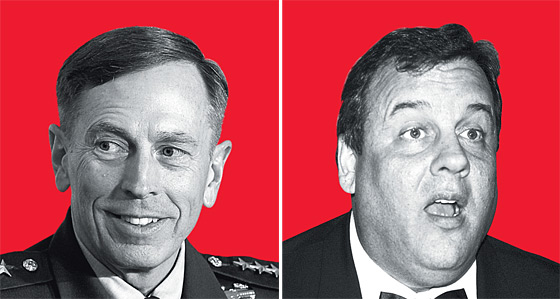 |
Left: Ailes dreamed of a David Petraeus candidacy, but Petraeus decided to run the CIA. Right: Chris Christie, Ailes’s dream candidate, has consistently said no way. (Photo: Chip Somodevilla/Getty Images (left); Splash News/Newscom (right)) |
Inside the White House, this statement was greeted with alarm. “The narrative was being hijacked by Fox,” Dunn told me. The White House attempted to isolate the network. In mid-September, when Obama agreed to appear on the Sunday political shows, he skipped Fox News Sunday, leaving Chris Wallace to take to the air on O’Reilly and complain, “They are the biggest bunch of crybabies I have dealt with in my 30 years in Washington.”
In early October, Dunn went on CNN and declared Fox the “research arm of the Republican Party.” Then, in late October, a Treasury Department official tried to deny Fox an interview with tarp compensation regulator Ken Feinberg. The move backfired when journalists from other networks, angered that the White House was picking on a member of the press, rallied behind Fox. David Axelrod called Ailes and blamed the decision on a low-level Treasury employee.
On Friday, October 23, Obama’s press secretary, Robert Gibbs, called Fox News senior VP Michael Clemente to work out a deal. Clemente didn’t take the call. Gibbs complained to Fox’s well-regarded White House correspondent, Major Garrett, that Clemente had blown him off. On Monday, Garrett participated in a conference call with Ailes and Clemente and told them that the White House was looking to end the war. Clemente still hadn’t returned Gibbs’s call.
“Maybe I’ll call him,” Clemente said.
Clemente called Gibbs on October 27 and traveled to Washington the next day to try to defuse the tensions. In November 2009, on a trip to Asia, Obama granted an interview with Garrett, his first since the war with Fox began. But the entire episode was taxing for Garrett. After clashing with Sammon over his partisan journalistic agenda, Garrett quit Fox months later to become a correspondent for National Journal.
“God’s really busy, Glenn,” Ailes told Beck. “He can’t be listening to you.”
At one point, Dunn spoke with David Rhodes. The two had remained friendly despite their clashes during the ’08 campaign. Rhodes, who had left Fox to run Bloomberg TV, told Dunn the White House was making a mistake in attacking Fox. “You guys have this all wrong,” Rhodes told Dunn. “Everything you’re doing is anticipating that they’re somewhere having a meeting which is like, ‘What if Beck says something that embarrasses us?’ That’s an NBC meeting. They have eight guys in suits in a conference room, and you’re playing this like an NBC meeting. Now, let me tell you what a Fox meeting is: A Fox meeting is, ‘Boy, he’s really emotional. Now he’s tearing up. What if he gets really emotional and doesn’t do the show and we don’t get the ratings, what are we going to do?’ ”
Still, both sides walked away claiming victory. “[Ailes] is great at making the mainstream press feel guilty about their liberal bias,” Dunn later told me. “Fox had taken on a thought-leader role in the national press corps. What we could influence was the way everyone else looks at Fox. Frankly, that’s the real problem.”
For Fox, the war with the White House only stoked ratings. A Fox executive told Clemente that the White House’s attacks were like “a hanging curveball” for Fox.
While Dunn and others publicly engaged Fox, David Axelrod worked back-channel diplomacy as the good cop. About a week before Dunn’s CNN appearance, Axelrod secretly sat down with Ailes at the Palm in midtown. They met before the restaurant opened to avoid drawing attention. Axelrod told Ailes they should try to defuse things and work together.
Going back to the 2008 campaign, Axelrod had maintained an off-the-record dialogue with Ailes. He had faced off against Ailes in a U.S. Senate campaign in the early eighties and respected him as a fellow political warrior and shaper of narrative. But early on, Axelrod learned he couldn’t change Ailes’s outlook on Obama. In one meeting in 2008, Ailes told Axelrod that he was concerned that Obama wanted to create a national police force.
“You can’t be serious,” Axelrod replied. “What makes you think that?”
Ailes responded by e-mailing Axelrod a YouTube clip from a campaign speech Obama had given on national service, in which he called for the creation of a new civilian corps to work alongside the military on projects overseas.
Later, Axelrod related in a conversation that the exchange was the moment he realized Ailes truly believed what he was broadcasting.
On a cold, rain-soaked Saturday last month, I traveled to Albany see the final leg of Beck’s nine-city comedy tour. It had been just over a week since news had broken that Beck would be leaving Fox. Shortly before 7 p.m., a crush of fans waited in the stiff drizzle for the doors to the Palace Theater to open. An elderly woman standing in line next to me told me that, in a way, she was glad Beck was leaving his Fox show. “I can’t tell you how many times I almost got in a car accident racing home from work to catch him at five o’clock,” she said. When I told her she could TiVo the show, she insisted she had to see it live.
No comments:
Post a Comment